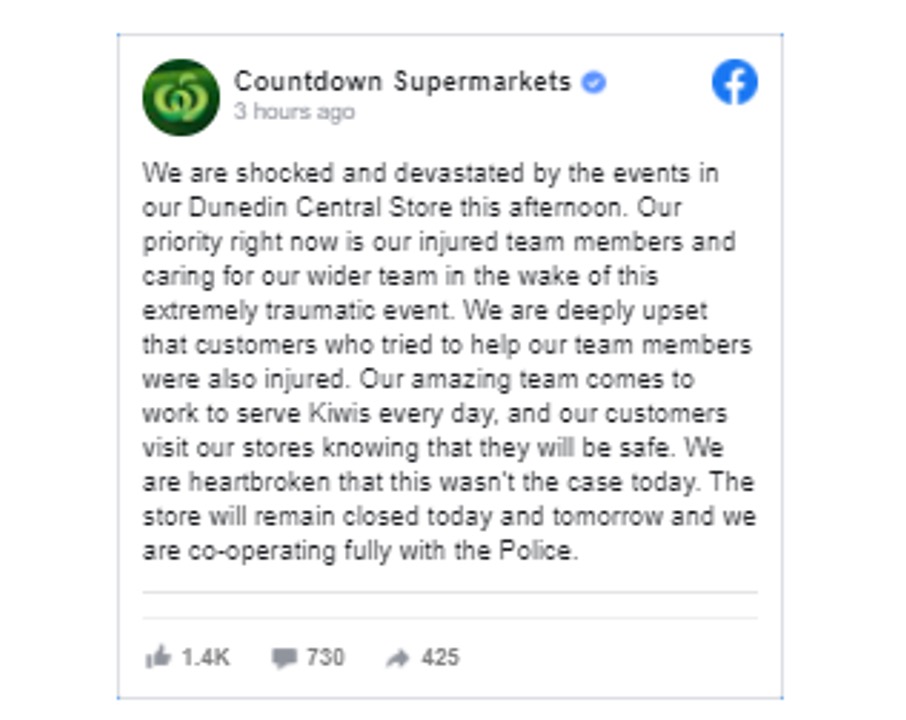Showing humanity in the face of a crisis
Tony Jaques analyses how a New Zealand supermarket chain dealt with a stabbing incident in one of its stores

When a stabbing frenzy at a supermarket in Dunedin, New Zealand, on May 10 left five people injured – three critically – the immediate media focus was on the bystanders who were hurt risking their own lives to subdue the assailant.
But equally praiseworthy was how the Countdown supermarket chain responded to the incident in its store.
Instead of the usual thoughts and prayers platitudes, which can often be deemed detached and impersonal, Countdown’s 102-word post on its Facebook page demonstrated genuine humanity.

The company didn’t just say it was sorry. It was shocked, devastated, deeply upset and heartbroken – words that are not often heard from a major corporation when things go wrong.
The stated first priority was absolutely textbook – focusing on the people directly affected and not on blame or speculation.
Next, the company addressed other members of staff, and then customers: “Our customers visit our stores knowing that they will be safe. We are heartbroken that this wasn’t the case today.”
Finally, it declared that the shop would be closed for two days and that it was co-operating fully with the police.
It is not known who wrote the Facebook post, but it certainly shows no sign of being carefully shaped or crafted by nervous lawyers.
While corporate crisis managers routinely plan for a range of potential events, the important lesson here is not so much about a random stabbing, but about how organisations respond to a high-profile incident or potential crisis.
It is clear that companies with many branches or worldwide operations are particularly vulnerable to events that happen far from head office. But size and distance should not prevent a proper response.
Take for example an incident in 2018, where two African American men were arrested for trespassing at a Philadelphia Starbucks while waiting for a friend. The CEO Kevin Johnson travelled to Philadelphia to meet the arrested men and announced he would close all 8,000 US stores for half a day so that about 175,000 employees could attend racial bias education to address implicit bias and prevent discrimination.
While Johnson’s decision to close every store generated predictable controversy, his words were a model of an effective communication: “I want to offer a personal apology to the two men who were arrested in our store. What happened in the way that incident escalated and the outcome, was nothing but reprehensible, and I am sorry... Now there’s been some calls for us to take action on the store manager. I believe that blame is misplaced. In fact, I think the focus of fixing this: I own it. This is a management issue, and I am accountable to ensure we address the policy and the practice and the training that led to this outcome.” His personal commitment was unambiguous and widely praised.
Compare this with the statement by Jim Murren, Chairman and CEO of MGM Resorts International, following the mass shooting in 2017 outside its Mandalay Bay Casino in Las Vegas, which killed 60 people and wounded over 400.
“Our hearts and prayers go out to the victims of last night's shooting, their families, and those still fighting for their lives. We are working with law enforcement and will continue to do all we can to help all of those involved.” And that was it, after America’s worst mass shooting.
Such events have become all too common in the United States, but some CEOs understand the need for more than thoughts and prayers.
Take Gavin Hattersley, President and CEO of Molson Coors, after a gunman killed five people at their Milwaukee brewery early in 2020. He said: “I am devastated to share that we lost five members of our family in this tragic incident. There are no words to express the deep sadness many of us are feeling right now. The important thing is that we support and care for each other.”
Or consider the words of Ernst Tanner, Global Chairman of Lindt after the deadly café siege in Sydney, Australia, in 2014: “I’m shocked and deeply saddened by the terrible incident that has taken place in Sydney. I cannot believe that such an act of violence happened. I would like to express my deepest sympathy to the victims and their families.”
It really isn’t that hard. But far too often, large organisations that face reputational crises are publicly criticised for lack of understanding and empathy, for hiding behind legal statements and for worrying more about share value and executive bonuses than their stakeholders.
Countdown is no minnow in the retail business. In fact, it is the largest single supermarket chain in New Zealand, owned by Woolworths NZ and, in turn, by Woolworths Australia. But for all its size and market presence, Countdown demonstrated that even a big organisation can show a human face.
Tony Jaques is an expert on issue and crisis management and risk communication. He is CEO of Melbourne-based consultancy Issue Outcomes and his latest book is Crisis Counsel: Navigating Legal and Communication Conflict.
Image and thumbnail: kubko/123rf
Image: Facebook, May 10, 2021